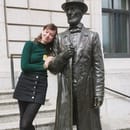As most people who know me are probably aware, I’m a big fan of history. It’s not something I keep particularly secret, or even veiled: one look at most of my social media pages and you’ll find many photos of me at historic sites which betray this side of me. I have framed portraits of Charles Sumner and John Quincy Adams hanging in my bedroom at home, and I even wrote my college admissions essay about how loving the study of history has helped me overcome various obstacles in my personal life. Absolutely nothing else I’ve ever been interested in has kept me so consistently or deeply enthralled. Simply put, history is the best long-term relationship I’ve ever had. For a long time, it’s been the subject that I’ve known I want to study as intensely and for as long as possible, as well as the one I hope to someday be able to teach.
Photo Credit: Zoe Packel
As anyone else who has discovered their passion knows, having something to get you through the day—whether it’s in the form of taking time to practice it, writing a paper that actually gets you excited to do research, or simply dreaming about one day doing it for a living—can make all the difference. However, it’s also not realistic to be able to devote all your time to one thing, especially in the first few years of college when we’re expected to fulfill core requirements, take classes in a wide breadth of subjects, and explore different areas before choosing a track to focus on.
Don’t get me wrong: this period of exploration is absolutely necessary, especially for those who don’t know what they want to study coming into college (which is completely fine and not at all a reason for stress), not to mention, it’s kind of the whole point of a “liberal arts education.” But it can also be frustrating when you think you may already know the direction you want to go in, or at least the ones you don’t.
At the beginning of the semester, I looked on with jealousy as my friends who attended other colleges entered school having already declared their major or chosen a specific track. Many of them had their academic trajectory for the next four or more years nearly entirely planned out by the time they began their first classes. I’ve joked recently that the friends I’ve made since coming to college aren’t prepared for the full extent of my nerdiness when it comes to history because I haven’t yet taken any classes in the department. This is simply because it wouldn’t have made sense for me to take intro-level History classes that I’d already received credit for from high-school courses, especially when I could have been using those slots to fulfill diversification requirements or take classes on subjects I don’t know anything about. I understand this, but that doesn’t mean it’s been easy. I came to college with the intention of majoring in History, and while I know I just need to be patient, that I’ll gain skills and experience which will enable me to focus on more specific subjects, I never considered how hard it’d be to motivate myself to get to that point. The fact is, school is a lot harder when you’re not super passionate about what you’re learning.
http://static.nautil.us/14515_1a1a998465d96b216610e8bf342343bb.jpg
At first, it was easy to be pessimistic, to dismiss the classes I was taking as unimportant because they weren’t what I saw myself doing in the future. But I’ve been trying to change my thinking about this. Not only is it ridiculous to expect that every class you take will be in the direct interest of your (potential) major, it’s also unrealistic in a broader sense: not everything in life is going to be exciting. It’s important to be able to get work done whether or not it’s something you’re passionate about because that’s what most of life, in and beyond college, will involve. Science, for example, might not necessarily interest me, but that doesn’t mean it isn’t important for me to take classes in it or to respect it as a discipline. Most importantly, I’ve tried to remind myself of how privileged I am to even have the opportunity to take these classes. When I consider how few people in the world are able to attend college, much less a private school like Kenyon, complaining that not all my classes are in subjects I’m passionate about feels a little ridiculous.
Last spring, I had the incredible opportunity to talk with Dr. Eric Foner, one of my absolute favorite American historians (and the author of my high school APUSH textbook – which I now own a signed copy of, not to brag), in his office at Columbia University. Besides valuable guidance on studying History in general, he also gave me a piece of advice that, at the time, I didn’t think too much about: don’t take only classes within your major. It’s better, he told me, to know a good amount about a lot of things than a lot about only one thing. In other words, it is essential to be well-rounded and well-informed about subjects outside of those you are immediately interested in studying. This advice, which I was originally hesitant to accept in my blind desire to take as many History classes as possible, has proven true and illuminating. Taking classes in fields other than history this semester has opened my eyes to other areas that I am interested in pursuing, possibly in conjunction with History. Ultimately, I am still most interested in and plan to major in History, but I also want to be open to the possibility that new subjects and ideas that I never considered before will shape my decisions in the future.
Registration for next semester is approaching, and however successful it may be, it’s likely that not every class you’ll register for is one you’re intensely interested in. That may be daunting, but try to remember that it’s not necessarily a bad thing.


